Friday Feb 27, 2026
Friday Feb 27, 2026
Saturday, 17 March 2018 00:00 - - {{hitsCtrl.values.hits}}
 Harassment of women on public transport in Sri Lanka and lack of high quality childcare services and marketable skills contribute to the declining female labour force participation in Sri Lanka, the World Bank says.
Harassment of women on public transport in Sri Lanka and lack of high quality childcare services and marketable skills contribute to the declining female labour force participation in Sri Lanka, the World Bank says.
World Bank Sri Lanka and the Maldives Operations Advisor Valerie Layrol addressing a roundtable discussion on ‘Women’s Accessibility’ on Thursday said Sri Lankan women, especially younger ones, do not sufficiently acquire marketable skills, face higher unemployment rates and can expect to receive lower wages than men.
According to a new report from the World Bank, ‘Getting to Work: Unlocking Women’s Potential in Sri Lanka’s Labour Force,’ Sri Lanka lags behind in women’s participation in the workforce, especially compared to other middle-income countries and despite steady economic growth, the number of women participating in Sri Lanka’s workforce has declined to 36% in 2016 from 41% in 2010.
The World Bank representative noted that there is a large degree of harassment of women on public transport in Sri Lanka and it is limiting women’s mobility, participation in public life and overall wellbeing.
According to the findings of a UNFPA study, over 90% of women have experienced harassment but just 4% of women have sought help from the Police. This study initiated in 2015 covered the whole country with 2,500 respondents included in the survey. Findings indicate a wide range of mistreatment on public transport including leering, verbal abuse and unwelcome advances. The majority of harassment was physical.
Layrol pointed out that women in low income groups of Sri Lanka rely heavily on public transport and there is clear evidence that harassment and the threat of harassment are limiting women’s mobility, participation in public life and overall wellbeing and removing these barriers to women’s paid work will encourage more Sri Lankan women to participate in the workforce.
Among many recommendations, safe childcare and transportation and implementing gender equal labour laws and practices are policy recommendations of the UNFPA study.
The roundtable discussion brought urban, social and transport sectors together with representatives from the Government, civil society, private sector and donors working on initiatives to improve women’s accessibility in the metro Colombo region.
The collaborative conversation aimed to exchange knowledge on the issue and identify gaps, share ideas based on experiences, especially initiatives led by the private sector and also identify ‘quick wins’ and small scale opportunities that could kick-start improvements to women’s accessibility and public transport experiences in the short term and also identify long term changes that would improve the liveability of metro Colombo region for both women and men.
“I believe all of us working in Sri Lanka are accountable to help expand women’s options for productive, safe and fairly compensated work which in turn would benefit her family and also the country,” the World Bank official said.